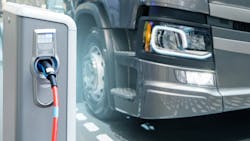A lot of the work NACFE has done lately has been on how to efficiently scale electric trucks. We are confident that the work we did on Run on Less – Electric and the reports that it generated on terminal tractors, vans and step vans, and heavy-duty long-haul tractors (with another report on medium-duty box trucks in the works) will help fleets make decisions about EVs.
However, we realize that it will take more than fleet interest and involvement to get to large-scale adoption of EVs. At this spring’s ACT Expo, we held a workshop on this very subject. We were very excited to see the mix of attendees including OEMs, fleets, utilities, people working on charging and infrastructure, government entities and more. All of us working together will come up with the needed solutions to widespread deployment of EV across a range of duty cycles.
See also: Ford Pro: Lightning pilot shows way to grow fleet electrification
I gave a presentation at the workshop, and we had a panel of fleets including Bill Bliem, senior vice president of fleet services, NFI Industries; Adam Buttgenbach, director of fleet engineering & sustainability, Pepsico; and Tim Rivera, director of fleet management for the Americas, DHL. Perhaps the most productive part of the workshop was the breakout sessions toward the end. People broke up into groups to talk about implementation and best practices, the right applications for EVs, and data and support. There were lively discussions in each job. Everyone at the workshop was there not only to learn but also to share what they have already learned about EVs.
NACFE is all about removing barriers to technology adoption, including providing access to information. In that spirit, I want to share some of the things that came out of these group discussions.
The group talking about the right applications confirmed much of NACFE’s findings on EVs. EVs make sense in local delivery and last mile delivery duty cycles, and in point-to-point trucking. That group also talked about some new charging options that may help mitigate some of the issues around charging, including in-pavement charging, catenary charging, and even charging inside buildings.
See also: EVs are a perfect fit for commercial vans
Those people looking at the data piece said data collected about EVs needs to focus on efficiency and range and include things like temperature, loads, auxiliary loads, topography, and driver behavior. One thing they would like to see is standards set for data transmission.
The group focusing on implementation advised to start small and to learn from EV school bus applications. They also talked about some of the barriers to bringing EVs and EV charging to a fleet location. To begin with, you need to prepare early, as lead times for utilities can be 1.5 to 2 years. If you are leasing property, the conversion to EVs gets more complicated because you will need to get approval from the property owner to make any substantive changes to the site. Other barriers are that the price of EVs is still too high, and there is not a clear dealer network for purchasing and support. On the back, the residual value of an EV is an unknown, and that makes it difficult to calculate the ROI.
And finally, the group looking at support talked about the need for training for dealers and high voltage training for anyone who will be servicing EVs. Tech schools need to begin developing EV service programs, and work needs to be done to educate consumers about electric trucks. The group said it would also like to see proactive support for utilities. Issues like the federal excise tax, leasing options, and policy support from government were also discussed.
See also: Working together to ensure EV servicing safety
There is still work to do on solving the challenges of EVs, but with so many creative minds working on it — as evidenced by the great work that came out of the workshop — I am very confident we will overcome challenges and get to a zero-emission future.
Michael Roeth has worked in the commercial vehicle industry for nearly 30 years, most recently as executive director of the North American Council for Freight Efficiency. He serves on the second National Academy of Sciences Committee on Technologies and Approaches for Reducing the Fuel Consumption of Medium and Heavy-Duty Vehicles and has held various positions in engineering, quality, sales, and plant management with Navistar and Behr/Cummins.
About the Author

Michael Roeth
Executive Director
Michael Roeth is the executive director of the North American Council for Freight Efficiency. He serves on the second National Academy of Sciences Committee on Technologies and Approaches for Reducing the Fuel Consumption of Medium and Heavy-Duty Vehicles and has held various positions with Navistar and Behr/Cummins.
